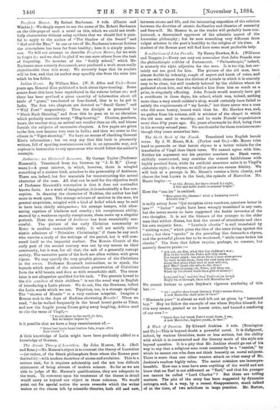Antinous : an Historical Romance. By George Taylor (Professor Hanstrath).
Translated from the German by "J. D. M." (Long- mans.)—A great interest, in which, however, there is mingled something of a sinister kind, attaches to the personality of Antinous. There are, indeed, but few materials for reconstructing the actual character of the man. All that can be said for the objective truth of Professor Hausrath's conception is that it does not contradict known facts. As a work of imagination, it is undoubtedly a fine con- ception. In drawing the character of Hadrian, the author has had more to work upon. The strange mixture of motives in the man, his general scepticism, mingled with a kind of belief which may be said to have been chiefly antiquarian ; his strange temper, with alter- nating caprices of kindness and cruelty ; his conspicuous ability, marred -by a weakness equally conspicuous, these make up a singular portrait. Here the writer of Antisous has been remarkably suc-
cessful. The picture of the early Christian community at Rome is another remarkable study. It will not satisfy enthu- siastic admirers of " Primitive Christianity," if there be any such who survive a study of the writings of the period, but it will com- mend itself to the impartial student. The Roman Church of the early part of the second century was not by any means an ideal community, but it was, for all that, the salt of a generally corrupt society. The narrative parts of the book are often written with great vigour. We may specify the very graphic picture of the Christians in the arena. Professor Hausrath rationalises, so to speak, the legends which speak of the miraculous preservation of Christians from the wild beasts, and does so with remarkable skill. The trans- lator is not altogether qualified for his task. " The parents bowed to the this manibus of their children" is not the usual way in English of introducing a Latin phrase. We do not, like the Germans, inflect the Latin words which we use. Tryphfina, too, is a strange spelling. The "shower of Missals" is a very curious misprint. Imagine a Roman mob in the days of Hadrian showering Missals ! When we read, "As be walked frequently in the broad laurel paths at Tibur, and saw the fragile young Comer going away laughing, Adrian used to cite the verse of Virgil,-
' I would show to the earth its fate, But no longer impose it,' "
is it possible that we have a hazy reminiscence of,-
" Osten4ent terris hunc tantum fate, neque ultra Esse sinent "
A little knowledge of Latin might have been profitably added to a knowledge of German.














































 Previous page
Previous page